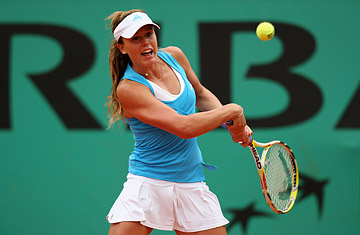
Michelle Larcher de Brito
Moan-ica Seles. Maria Shriek-apova. For years, the grunts and shrieks of top female tennis players at Wimbledon have provided fodder for Britain's pun-loving tabloid journalists. Armed with a Bruel & Kjaer sound-level meter that they refer to as the "grunt-o-meter," they have at various times informed readers that tennis players are noisier than a pneumatic drill, a police siren or a 747 taking off. But at this year's Wimbledon, grunting will be put under more serious scrutiny: officials have confirmed that they will be meeting to discuss whether to make loud exhalations during play illegal.
The announcement follows the fallout from a May 29 match between a 16-year-old Portuguese player, Michelle Larcher de Brito, and France's Aravane Rezai at the French Open in Paris. During the match, Rezai complained that Larcher de Brito's shrieking was distracting her and hindering her play. The chair umpire did not penalize Larcher de Brito, choosing instead to ask her during a changeover to muffle her cries. Currently, the rules of tennis state that a player should be penalized only if he or she deliberately interferes with an opponent's performance. But proving that a player's grunting is an act of gamesmanship — rather than an involuntary response to the exertions of high-level tennis — is nearly impossible.
For this reason, the Grand Slam Committee, which determines the rules governing tennis' four major events, will meet at Wimbledon this week to discuss whether a new rule should be introduced that addresses grunting. "In light of the controversy at the French Open, the Grand Slam Committee will be meeting to see if anything can be done to make enforcement [of grunting] more official and explicit," a spokesperson for the International Tennis Federation (ITF) tells TIME, on condition of anonymity in accordance with ITF policy.
As the committee produces its rulebook annually, any new restriction on grunting would not come into force until 2010. But the ITF spokesperson adds that officials at Wimbledon may choose to adopt a stricter interpretation of the hindrance rule, issuing warnings or even point penalties against noisy offenders.
Recently retired Wimbledon referee Alan Mills believes that grunting begets grunting. "A kind of counter-grunt has emerged in recent years, whereby offended parties ape their opponent's noises," he said in 2005. After the French Open match in May, a tearful Larcher de Brito made clear that she felt she was unfairly targeted because other grunters — such as Maria Sharapova and the Williams sisters — tend to be superstars. "You know, [the umpire] doesn't tell Maria [Sharapova] to keep quiet," she said.
The de facto head of the anti-grunting lobby, tennis legend Martina Navratilova, believes players of all rankings must have their throaty exclamations curtailed. She used her acceptance speech for the ITF's Philippe Chatrier Award — which honors dedication to the sport — on June 2 to say that grunting "is cheating, pure and simple. It is time for something to be done." Navratilova says grunting disguises the sound of the ball hitting the racquet, which she claims an opponent needs to hear to quickly gauge the power, spin and depth of an incoming shot.
There is some scientific evidence to support this claim. University of Sydney physicist Rod Cross has shown that a player's sensitivity to string tension decreases if they wear ear plugs or use a sound dampener on their strings — in other words, a tennis player's perception is dictated by aural stimuli as much as visual or tactile cues. Former World Number One and current Champions Series player Jim Courier notes that players face a similar challenge when battling under the flight path of noisy passenger jets at the U.S. Open's Flushing Meadows grounds. "It's tough for players to react to shots," he says on his Twitter page. "I don't claim malicious intent [by grunters] but the result is the same. It needs to be policed."
But while it may have affect competition, the grunting debate also raises uncomfortable gender and cultural issues. Some commentators point out that male grunters, such as Jimmy Connors and current pro Fernando Gonzales, don't face the same criticisms. Indeed, since Monica Seles kicked off the grunting debate in 1990, British tabloids have reveled in its sexual undertones (they aren't the only ones).
It's also telling that Wimbledon is where the grunting debate receives the most prominence. The tournament is run by the genteel All-England Lawn Tennis and Croquet Club, which as recently as the late 1970s favored the use of women's married names on the scoreboard (for Chris Evert, for example, it read "Mrs. John Lloyd"). The club still refers to the respective singles events as "Gentlemen's and Ladies' Singles," clings to a traditional dress code of all-white and goes at great lengths to paint everything surrounding the courts green. This affection of tennis as a seemly, middle-class garden sport could not be further from the reality of the hothouse tennis academies where most of the loudest female players — Larcher de Brito, Sharapova and Seles — came scrapping and shrieking up through the ranks.
While Navratilova and others claim that silent players are at a disadvantage, history shows it might be the noisier players who suffer on the court, at least in the short-term. At the 1992 Wimbledon final, for example, Seles, after being savaged in the press for her distinctive two-tone grunting, played in near silence and was defeated by German Steffi Graf. After the match, Graf admitted, "There was so much talk about her grunting that I think maybe it got to her a little bit." That's enough to make a competitive tennis player howl.
